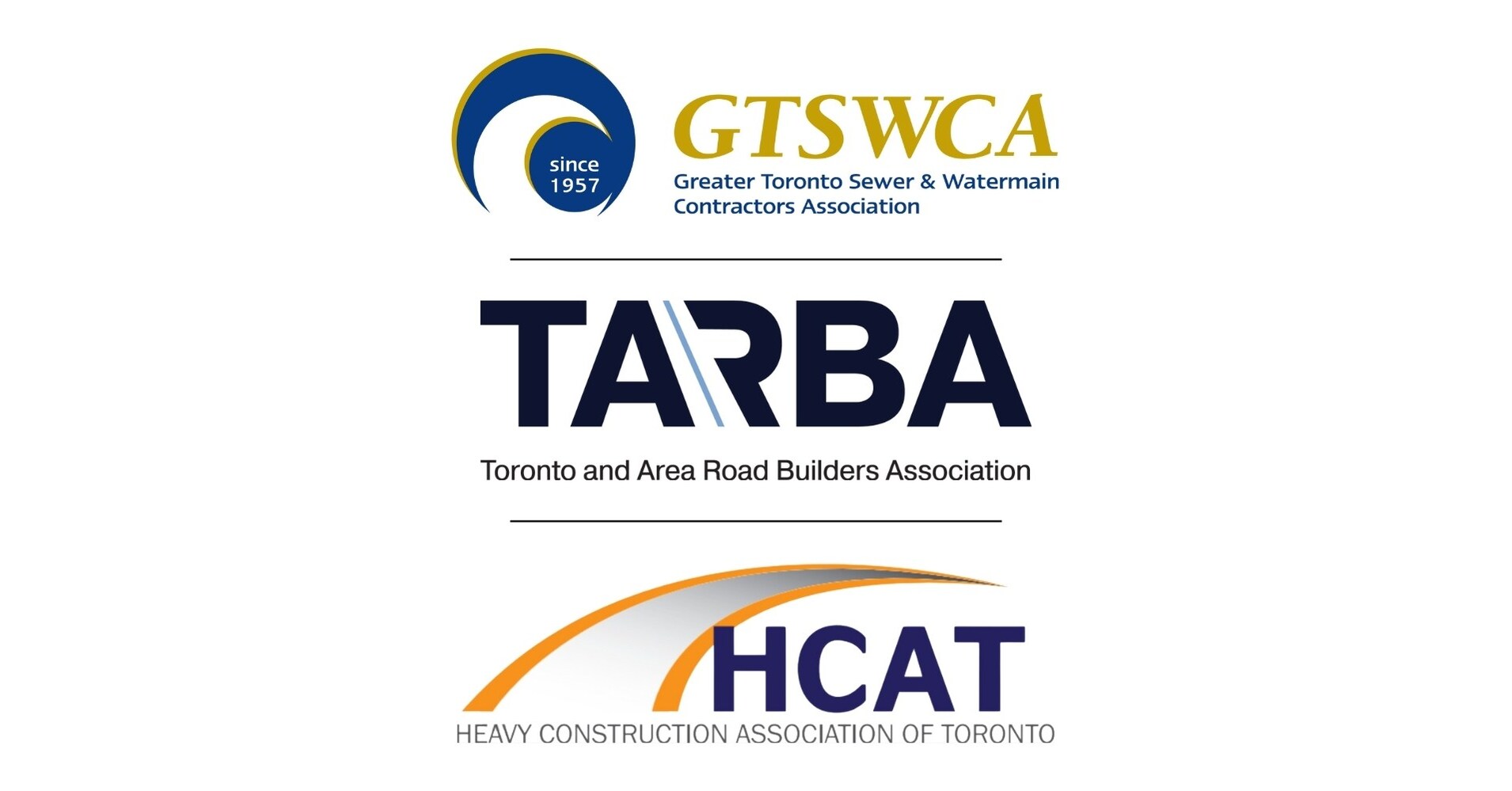Infra
Municipal Infrastructure Contractors Call for Improved Construction Practices to Alleviate Traffic Congestion in Toronto

TORONTO, Sept. 10, 2024 /CNW/ – The Toronto and Area Road Builders Association (TARBA), the Greater Toronto Sewer and Watermain Contractors Association (GTSWCA) and the Heavy Construction Association of Toronto (HCAT)—whose members collectively are responsible for 75 percent of the City of Toronto’s total construction capital spend—are calling on the City of Toronto to improve procurement practices to accelerate project timelines, mitigate traffic congestion, and reduce overall costs.
“We are still using infrastructure that was put in place by our grandparents, and we are now seeing the impacts of underinvestment from past decades with this summer’s flooding and ongoing lack of affordable housing,” said Patrick McManus, Executive Director of GTSWCA. “With Toronto’s continued growth and changing climate, delaying investments and halting construction is not an option, and less bureaucratic delays will only help get projects built faster and reduce continued traffic congestion.”
“While lane closures during construction may be seen as a nuisance for commuters and local businesses, they are crucial safety features in construction work zones that protect both workers and the public and allow space for essential equipment and waste disposal,” said Raly Chakarova, Executive Director at TARBA. “Increasing fees for this necessary safety buffer between active traffic and construction zones will not alleviate congestion, but it will increase building costs for taxpayers.”
“The competing priorities of accelerating construction timelines and maintaining acceptable noise levels for city residents make it clear that 24/7 construction has limitations in densely populated areas,” said Peter Smith, Executive Director at HCAT. “This approach can only be effectively implemented under specific circumstances and must be included in project planning documents at the time of tender so it can be priced accordingly.”
TARBA, GTSWCA, and HCAT jointly propose the solutions below to accelerate construction timelines, alleviate traffic congestion, and reduce taxpayer costs:
- Early Tendering and Faster Project Award: By tendering and awarding projects, like road maintenance and sewer expansion, earlier in late Fall or early Winter for the following year, the City can maximize the construction season while receiving more competitive pricing.
- Incentivize Project Acceleration: Offering incentives for early project completion, rather than just penalties for delays, can expedite construction timelines.
- Empower Decision-Making by Project Managers: Project managers should have the authority to make decisions during design conflicts to manage disputes and prevent construction delays.
- Better Coordination and Communication: Improving project coordination and clear communication with residents can reduce disruptions and maintain public trust.
- Promote a Culture of Innovation: Proactive collaboration between city officials and contractors on risk-sharing and modern procurement models can help unlock efficiencies.
About TARBA
The Toronto and Area Road Builders Association (TARBA) represents contractors involved in the new construction and maintenance of roads, sidewalks, highways, and other critical infrastructure in the Greater Toronto Area. TARBA advocates for policies and practices that promote safe, efficient, and sustainable infrastructure development. www.tarba.org
About GTSWCA
The Greater Toronto Sewer and Watermain Contractors Association (GTSWCA) serves as a collective voice for its members who build water, wastewater, and stormwater infrastructure across the Greater Toronto Area. www.oswca.org
About HCAT
The Heavy Construction Association of Toronto (HCAT) represents contractors in the heavy civil engineering construction sector, including bridge construction and rehabilitation, tunnels, marine construction, and structure foundations. HCAT advocates for best practices in infrastructure development while addressing industry challenges, providing educational opportunities, and promoting safety and sustainability. www.hcat.ca/
BACKGROUNDER
TARBA, GTSWCA, and HCAT jointly propose the solutions below to accelerate construction timelines, alleviate traffic congestion, and reduce taxpayer costs:
- Early Tendering and Faster Project Award
By tendering and awarding capital projects—particularly linear infrastructure like road maintenance and sewer expansion—in late Fall or early Winter for the following year, the City can maximize the number of working days within the construction season and will likely receive more competitive pricing.
The current practice of awarding these vital construction projects in Spring or even Summer restricts the timeline needed to complete the work, as most work must cease by late November due to weather conditions, and nearly guarantees that some projects must roll over and be completed in the following year, coinciding with other planned projects and exacerbating congestion issues.
Other GTA municipalities approve their capital budgets in December, separately from their operation budgets that are approved later in March/April, allowing them to award projects earlier, receive more competitive pricing, and commit contractors to the work. In contrast, Toronto is left with a smaller pool of bidders and likely higher pricing. Additional administrative award processes in Toronto mean that even city projects that are already approved as part of the ten-year capital plan and/or the annual budget face further delays before being awarded and the work starting (an average of 60 days, and some as long as 190 days, from bid close to award date).
2. Incentivize Project Acceleration
Contractors undertake the construction project based on the conditions of the negotiated contract. While there are severe financial penalties for projects running late, there are rarely any financial incentives for finishing early or for easing traffic congestion when possible, such as clearing lane closures on weekends or evenings if no work is planned. Since moving pylons, equipment, and/or waste containers back and forth takes workers time, a built-in incentive can help streamline traffic flow outside of construction hours.
For example, some neighbouring municipalities include a contingency amount in each project so that project managers can approve necessary change orders and acceleration opportunities at their discretion.
3. Empower Decision-Making by Project Managers
Linear and underground construction projects always encounter design conflicts as the conditions under a road can rarely be fully accounted for before demolition begins. This includes unmarked ground utilities, archeological ruins, and even buried waste. As such, no project can ever be executed as initially designed since there are always unexpected hurdles once construction starts.
Project managers should be granted much greater powers to decide how projects should proceed when a conflict is identified (called a change order), as is the practice in neighbouring municipalities. Over-reliance on procurement and legal staff to make these technical engineering decisions creates significant payment disputes and delays on city projects.
Currently, project changes can take weeks (or longer) for approval—and some have to go all the way up to City Council—while a project sits idle due to uncovering a complication not identified in the project drawings. Given the size and scope of project work in the City of Toronto, project managers should be able to approve change orders up to 5% of the contract value or $150,000 (whichever is the lesser). For change orders exceeding this value, the City should commit to reviewing and responding to these requests immediately.
4. Better Coordination and Communication
Improved coordination is needed both between different projects and within individual projects. Consistent traffic modeling is needed to assess the impact on traffic accurately. Consulting with contractors on traffic plans for projects well in advance of the project start date will significantly reduce any inconsistencies between what is on paper and what can reasonably be implemented in the field.
Taking the time to review upcoming projects and priorities for a specific area can also minimize disruption. For example, coordinating watermain/sewer work, road work, and bike lanes installation and maintenance under the same contract and/or timeline can significantly reduce both building costs for taxpayers and disruption for residents.
Additionally, clear communication with residents about the necessity of project work and timelines should always be prioritized to maintain public trust and understanding.
5. Promote a Culture of Innovation
Despite bearing nearly all the risk and being responsible for the final project outcome and long-term performance, contractors often face a risk-averse city administration hesitant to adopt new technologies or procurement models. This means that contractors must abide by the city’s contract specifications and conditions even if there is a better, faster way to build.
For example, on complex projects, adopting a Design-Build Model where a single entity provides design and construction services under a single contract can unlock efficiencies and encourage innovation.
SOURCE Toronto and Area Road Builders Association (TARBA)
Media Contact : For media inquiries or further information, please contact Raly Chakarova, Executive Director, TARBA at [email protected] or Patrick McManus, Executive Director, GTSWCA at [email protected].










